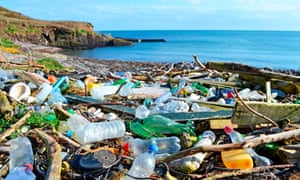https://www.theguardian.com/environment/2019/jan/21/founders-of-plastic-waste-alliance-investing-billions-in-new-plants
Founders of plastic waste alliance ‘investing billions in new plants’
European NGO says firms are likely to be at centre of global boom in plastic production
The founding companies behind a self-styled alliance to end plastic waste are among the world’s biggest investors in new plastic productions plants, according to a European NGO.
A majority of the firms which announced this week they were collaborating to try to help tackle plastic pollution are likely to be at the heart of a global boom in plastic production over the next 10 years.
Together the companies have committed $1bn (£778m) over the next five years to reduce plastic production and improve recycling, with an aspiration to raise that to $1.5bn if more members join.
But most of the founding firms have tens of billions of dollars riding on the need for global plastic production to continue growing over the next decade and more.
Shell, one of the signatories, is building a multibillion-dollar plant in Pennsylvania in the eastern US, using shale gas as its fuel to produce 1.6m tonnes of polyethylene – the world’s most common plastic – each year.
ExxonMobil, another leading figure in the alliance, is building a new polyethylene production line at its plant in Mont Belvieu, Texas, to increase plastic production to more than 2.5m tonnes a year. When completed it will be one of the largest plastic production units in the world.
Saudi Arabia’s state oil company Saudi Aramco and the country’s chemical giant SABIC are building one of the world’s largest oil-to-petrochemicals factories as they – like other fossil fuel companies – move away from reliance on crude oil revenues.
Many of the production plants are linked to fracking. Fossil fuel companies have invested more than $180bn since 2010 in new “cracking” facilities that will produce the raw material for everyday plastics for use in packaging, bottles, trays and cartons, helping to fuel a 40% rise in plastic productionover the next decade.
Rob Buurman, the director of environmental NGO Recycling Netwerk, said: “It is interesting to see [the plastics industry] finally acknowledge that there is a problem with their plastics.
“But unfortunately, this initiative does not tackle the problem at its source: the gigantic production of 400m tonnes of plastic each year, with 60m metric tonnes produced in Europe alone.”
More than 8.3bn tonnes of plastic have been produced globally since large-scale production began in the 1950s, creating almost 6bn tonnes of plastic waste. Only about 9% of this has been recycled. The rest has been burned and contributes to climate change or is still polluting the environment. Most plastics are used for the production of packaging, which is often single-use.
Buurman said street, river and beach cleanups would not work as long as there was a steady stream of new plastics being produced and collected in a half-hearted way.
“These kind of actions want to cure the image of plastic. But plastics don’t have an image problem – the exaggerated use of it in products with a short lifespan is a problem in itself,” he said.
About 8m tonnes of plastic waste is dumped in the seas annually, according to the UN. Plastic in the seas can choke fish and other marine creatures, destroy habitats and enter the food chain. But despite increasing public awareness of the problem, highlighted by Sir David Attenborough’s Blue Planet II programmes, there has been little sign of it abating.
A spokesman for the alliance said: “Reducing the amount of plastic required to create products while preserving the benefits people rely on and making plastics easier to recycle is definitely part of the solution. Not all alliance members produce plastic. Some of the members do produce plastic, and some have announced expansions to meet the demands of a growing population.
“Plastic provides many critical health, safety and sustainability benefits that help improve and maintain living standards, hygiene and nutrition around the world and replacing it could, in the end, do more harm than good.”
He said a study by the firm Trucost in 2016 found that replacing plastic packaging with other materials would increase the amount of packaging generated in the US by 55m tons annually and increase energy use and carbon emissions by 82% and 130%, respectively.
“Even as we work aggressively to reduce plastic waste in the environment, we must maintain the critical benefits that plastics bring to people and communities. It is not either/or. With a thoughtful, comprehensive and strategic approach, we can do both,” he said.
The founding members of the Alliance to End Plastic Waste are: BASF, Berry Global, Braskem, Chevron Phillips Chemical Company LLC, Clariant, Covestro, Dow Chemical, DSM, ExxonMobil, Formosa Plastics Corporation, Henkel, LyondellBasell, Mitsubishi Chemical Holdings, Mitsui Chemicals, NOVA Chemicals, OxyChem, PolyOne, Procter & Gamble, Reliance Industries, SABIC, Sasol, SUEZ, Shell, SCG Chemicals, Sumitomo Chemical, Total, Veolia, and Versalis.

沒有留言:
張貼留言